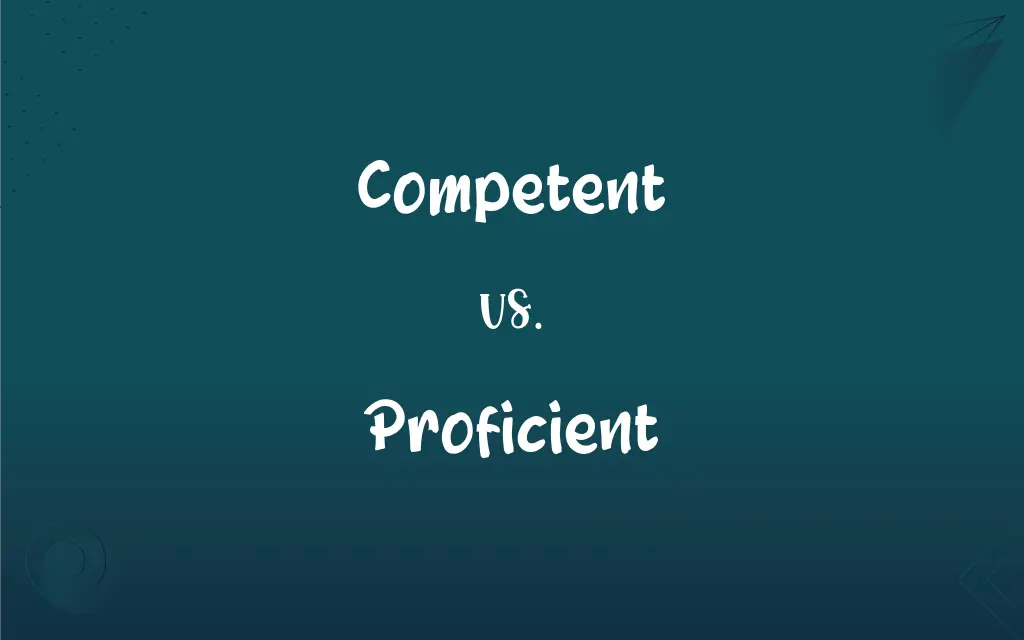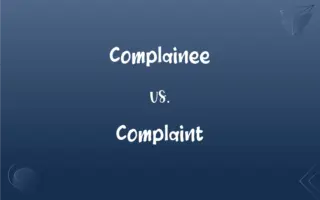Competent vs. Proficient: What's the Difference?
Edited by Aimie Carlson || By Janet White || Updated on November 29, 2023
Competent means having the necessary ability or skills to do something successfully, while proficient implies a higher degree of skill or expertise in a particular field.

Key Differences
Competent refers to having just enough skill and knowledge to perform a task successfully. Proficient, however, implies a greater degree of skill, often acquired through practice and experience.
Being competent in a task means one can achieve expected results, often meeting basic standards. Being proficient suggests not only meeting but often exceeding the standard expectations with higher efficiency.
In the workplace, a competent employee can handle their responsibilities effectively. A proficient employee, in contrast, demonstrates a high level of expertise and can often tackle more complex challenges.
In learning a new skill, achieving competence means grasping the fundamentals. Achieving proficiency involves mastering the nuances and advanced aspects of that skill.
Competence can be considered a prerequisite for proficiency. While competence indicates adequacy, proficiency denotes a more advanced, skilled, and often intuitive understanding of a subject.
ADVERTISEMENT
Comparison Chart
Skill Level
Adequate skills for basic tasks.
High-level skills for complex tasks.
Expertise
Basic understanding of a subject.
Deep and nuanced understanding.
Performance Expectation
Meets standard expectations.
Exceeds standard expectations.
Learning Stage
Fundamental grasp of skills.
Advanced mastery and application.
Workplace Role
Effective in handling responsibilities.
Highly skilled in tackling complex challenges.
ADVERTISEMENT
Competent and Proficient Definitions
Competent
Sufficiently skilled.
He was competent in his understanding of the software.
Proficient
Advanced in learning or skill.
She is proficient in three foreign languages.
Competent
Capable of performing tasks.
She proved competent in managing the project.
Proficient
Expert or well-advanced in an art, subject, or skill.
The artist is proficient in watercolor techniques.
Competent
Adequately qualified.
The technician was competent in basic repairs.
Proficient
Highly skilled and knowledgeable.
The programmer was proficient in multiple coding languages.
Competent
Having the necessary ability.
The teacher was competent in delivering the lesson.
Proficient
Demonstrating a high level of performance.
She is proficient at problem-solving in challenging situations.
Competent
Meeting basic standards.
Her cooking skills were competent for the family dinner.
Proficient
Competent with a high degree of expertise.
He is proficient in complex financial analysis.
Competent
Properly or sufficiently qualified; capable
A competent typist.
Proficient
Having or marked by an advanced degree of competence, as in an art, vocation, profession, or branch of learning.
Competent
Adequate for the purpose
A competent performance.
Proficient
A person who exhibits such competence; an expert.
Proficient
Good at something; skilled; fluent; practiced, especially in relation to a task or skill.
He was a proficient writer with an interest in human nature.
Proficient
An expert.
Proficient
One who has made considerable advances in any business, art, science, or branch of learning; an expert; an adept; as, proficient in a trade; a proficient in mathematics, music, etc.
Proficient
Well advanced in any branch of knowledge or skill; possessed of considerable acquirements; well-skilled; versed; adept,
Proficient
Having or showing knowledge and skill and aptitude;
Adept in handicrafts
An adept juggler
An expert job
A good mechanic
A practiced marksman
A proficient engineer
A lesser-known but no less skillful composer
The effect was achieved by skillful retouching
FAQs
How does one move from competence to proficiency?
Moving from competence to proficiency typically involves more practice, experience, and deeper understanding.
What defines a proficient individual?
A proficient individual demonstrates a high level of skill and expertise in a particular area.
Is competence enough in a professional setting?
Competence is often enough for basic tasks, but proficiency is preferred for more complex roles.
How long does it take to become proficient?
The time to become proficient varies greatly and depends on the individual's dedication and the complexity of the skill.
Can proficiency be measured?
Proficiency can often be measured through assessments, performance evaluations, and practical demonstrations.
Does proficiency require continuous learning?
Yes, maintaining proficiency often requires continuous learning and staying updated in the field.
How is competence assessed?
Competence is assessed through basic skill tests, performance reviews, and meeting job requirements.
What are the signs of proficiency in a skill?
Signs of proficiency include ease in performing complex tasks and the ability to solve advanced problems.
Is competent a compliment?
Yes, being called competent is a compliment, though it suggests basic rather than advanced skill.
What’s the role of experience in achieving proficiency?
Experience plays a crucial role in achieving proficiency, as it allows for practical application and deeper understanding.
What does it mean to be competent?
Being competent means having enough skill and knowledge to do something successfully.
Can one be competent but not proficient?
Yes, one can be competent at a task without reaching the higher skill level of proficiency.
Are all professionals proficient?
Not necessarily; while professionals are expected to be competent, proficiency is an advanced stage.
What is a proficient level in language learning?
In language learning, proficiency means being able to use the language fluently and accurately in complex situations.
Does proficiency guarantee success?
Proficiency increases the likelihood of success but doesn't guarantee it, as other factors also play a role.
Can one be proficient in multiple fields?
Yes, it's possible to be proficient in multiple fields, especially with dedication and practice.
How do employers view competence vs. proficiency?
Employers view competence as meeting job requirements and proficiency as exceeding them and adding more value.
Is there a standardized test for proficiency?
For some skills and languages, there are standardized tests to measure proficiency, but it varies by field.
Can a person be naturally proficient?
Natural talent can contribute to proficiency, but it usually requires practice and experience as well.
Can proficiency fade over time?
Yes, without practice and continual learning, proficiency in a skill can diminish over time.
About Author
Written by
Janet WhiteJanet White has been an esteemed writer and blogger for Difference Wiki. Holding a Master's degree in Science and Medical Journalism from the prestigious Boston University, she has consistently demonstrated her expertise and passion for her field. When she's not immersed in her work, Janet relishes her time exercising, delving into a good book, and cherishing moments with friends and family.
Edited by
Aimie CarlsonAimie Carlson, holding a master's degree in English literature, is a fervent English language enthusiast. She lends her writing talents to Difference Wiki, a prominent website that specializes in comparisons, offering readers insightful analyses that both captivate and inform.































































